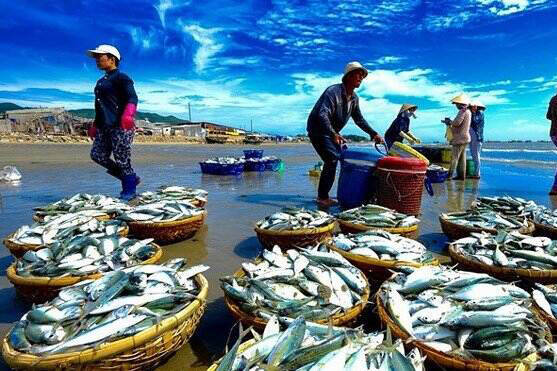Vietnam tries to remove 'yellow card' from the beginning of the year
After the second inspection, the European Commission (EC) continues to extend for Vietnam another six months (January - June 2020) to try to remove the "yellow card" for seafood exports. From the beginning of this year, the seafood industry has been implementing a number of solutions, expecting to be able to get positive results in the next inspection.

"Erasing" violating fishing vessels
The EC Delegation of the General Affairs Department on Marine and Fisheries Affairs came to Vietnam for a second inspection of the implementation of recommendations related to illegal, unreported, and unregulated (IUU) fishing activities from November 5 to 14, 2019.On November 19, 2019, Vietnam received a notice of comments for the contents: tested and Vietnam will have an additional six months to consider removing the "yellow card". The EC inspection team confirmed: Vietnam has made progress compared to the first inspection (May 2018) and is on the right track. This is reflected in the fact that Vietnam has initially implemented the Fisheries Law and its actual guiding documents.
In the early days of 2020, talking with reporters of the Customs Newspaper onremoving the "yellow card" for Vietnamese seafood, Tran Dinh Luan, Director General of the General Department of Fisheries (MARD), affirmed that:The key is to solve the problem of Vietnamese fishing vessels illegally fishing in foreign waters. Theoretically, if Vietnam only has one fishing vessel violating, the ability to withdraw the "yellow card" is very difficult. This is because when Vietnamese fishing vessels violate, countries will respond directly to the EU, using non-governmental organizations to pressure the EU.
Recently, one of the problems when dealing with illegal fishing boats in foreign waters is that there are localities that are not really strict. When detecting a violation, it is not necessary to immediately sanction the culprit, leave the situation prolonged or not impose a heavy fine so that people change. Luan said: “One of the EC recommendations for Vietnam is to organize synchronous treatment in all 28 coastal provinces and cities. For example, the same act of violation must be treated the same and severely punished. Next, the localities must make a list of ships at risk offishing illegally to manage them.”
The Head of the Directorate of Fisheries said: The 6-month period that EC extended means a lot ofpressure. During the past two years, the whole sector has been trying to develop the Fisheries Law, decrees, circulars. Making laws at the central level only makes it easy to focus. Currently entering the actual implementation process, the 28 coastal provinces and cities must be synchronized equally. Meanwhile, the perceptions and practices of the localities are not the same, it is possible that the situation in this province will stretch and the fishing vessels violating will goto other provinces. That is a great challenge.
“In fact, when fishing boats are caughtfishing illegally they usually take at least one pair, or four to five. As such, illegal fishing must be organized only at the grassroots level. Local responsibility and decisiveness play an extremely important role. The government has to propagate and mobilize the situation to look forward to solving the root of the problem,” Luan emphasized.
Doing good traceability
In addition to thoroughly solving the situation of illegal fishing vessels, completing the installation of monitoring equipment and good traceability are also important factors for Vietnam to remove the "yellow card" in the near future.
Tran Dinh Luan said a ship is worth tens of billion of dong, so a few tens of millions moreto install equipment is not too high. The problem is people's consciousness. At present, the local solution is to check all the regulations when checking the ship and see if the ship has installed monitoring equipment. If the ship is not completed by the registration time, it will not be registered, meaning it will not be allowed to sail. “Currently, the ships from 15m to less than 24m withinstalled monitoring equipment is 30%. If the ship does not install cruise control equipment, it is determined that the ship will not be registered, registered and not set sail,” Luan said.
Traceability today is also a problem that is difficult to identify. Fishery enterprises struggle against strict regulations to prove that imports or purchases at sea must have clear origins. Currently, the EC is requesting amendments to Circular 21/2018/TT-BNNPTNT regulating the recording, submission of reports, diaries of fishery exploitation; publish the fishing port designation certifying the origin of aquatic products from exploitation; list of illegal fishing vessels; certify raw materials, certify the catches to ensure the best content of traceability.
"During the first six months of the year, the whole industry will focus on key solutions, both in terms of propaganda and timely handling to prevent infringing fishing vessels in foreign waters; ensure the schedule of installing cruise monitoring equipment andtraceability. In the long term, to ensure the sustainable development of the fisheries sector, the issues raised are restructuring of the industry; investigating resources; restructure fleets and trades accordingly; reducing exploitation intensity, increasing conservation; and developing aquaculture,” Luan added.
By Thanh Nguyen/ HuuTuc
Vietnam Custom News